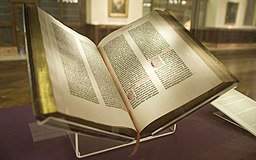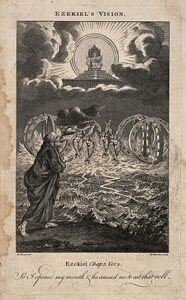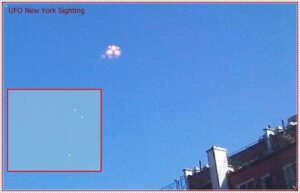The Bible in a Secular World
In his 1916 address “The Strange New World Within the Bible,” Karl Barth asked the question, “What sort of country is spread before our eyes when we throw the Bible open?”[1] Barth’s question assumes that engaging the Bible means dealing with a new reality or a new engagement with reality.
Over one hundred years later, does Barth’s question make sense to contemporary Christians? Do congregations expect to ask “what sort of country” opens before them? Or do they expect very little from the Bible?

Gutenberg Bible Lenox Copy, New York Public Library, 2009,Creative Commons Attribution-Share Alike 2.0 Generic
In the mid-twentieth century, New Testament scholar Rudolph Bultmann wrote “We cannot use electric lights and radios and, in the event of illness, avail ourselves of modern medical and clinical means and at the same time believe in the spirit and wonder world of the New Testament.”[2] Modern science and technology make the worldview of Scripture less plausible.
At First Baptist Church of Athens, Georgia, the church I serve, Bultmann’s statement resonates more than Barth’s question. The congregation is upper-middle class, highly educated, politically diverse, and mostly white. Many members grew up in conservative Christian households, often Southern Baptist, where the Bible was highly esteemed. First Baptist Athens has become a home for people who don’t feel they fit in the churches of their childhoods.
For many members, the Bible is more of a question than an answer. The Bible stories of angels appearing, God speaking, and the blind seeing don’t easily fit with the scientific understandings of the modern West. The moral meaning of Scripture is more accessible and comfortable than more spiritual understandings. Christian Smith has even described this version of Christianity as “moralistic, therapeutic Deism.”[3] We can call this moralism for short.
Moralism is evident in what churches value. The energizing debates in many denominations surround moral issues surrounding sexuality and reproduction. Christian taking different positions tend to make similar arguments, appealing to certain principles. Denominations split and congregations fracture almost entirely around moral positions.
Influenced by moralistic Christianity, a church goer might comment “Could this prophet have been using drugs?” when reading about a supernatural experience in Scripture. The question isn’t meant to be dismissive. The questioner is trying to make sense of what we know- ingesting certain chemicals gives people an altered state of perception. Since Scripture depicts people experiencing altered states of perception, perhaps drugs are involved. Moralism remains close at hand.
Despite the success of scientific perspectives, people continue to have strange experiences that are not easily explained. According to a recent survey, 65% of people have had paranormal experiences.[4] Interest in the paranormal has increased- horror movies, podcasts, and documentaries regularly explore these themes.
I wondered if bringing paranormal stories into conversation with biblical stories would make spiritual views of reality more plausible for my congregation. There might be a “strange new world” in the pages of Scripture that can connect to our lives.
New Conversation Partners
I offered several sessions of 3 week study entitled “Angels on the Radar?: Reading the Bible with Paranormal Parallels” for my congregation. Each session engaged several Scriptural stories in conversation with a contemporary paranormal experience.
The first session explored ghost stories. From the Bible, we read the account of the (dead) Samuel’s appearing to the medium of Endor in 1 Samuel 28 and the appearance of saints in Matthew 27. The paranormal parallel came from the late twentieth century- the sightings of deceased passengers and crew of the crashed Eastern Air Flight 401. We explored the question, what does it mean that living people believe they have seen deceased people?
The second session engaged the phenomenon of UFO’s and abductions. In Ezekiel 1, the prophet has visions of metallic objects in the sky by the river Chebar. In 2 Corinthians 12, Paul refers to someone being “caught up” into the third heaven. These biblical examples were brought into conversation with the famous abduction experience of Barney and Betty Hill.

“Ezekiel has a phantasmagorial…”Copyrighted work available under Creative Commons Attribution only licence CC BY 4.0 http://creativecommons.org/licenses/by/4.0/
The final session centered on angels. Angels appear throughout the Bible, but we specifically looked at the angel Gabriel’s appearance to Joseph in Matthew 1. The parallel appearance of an angelic nurse to a mother in a pediatric hospital. These angelic encounters involve a renewing strength in difficult times.
These conversations raised questions about how we view the world. Why do people continue to have experiences that are difficult to explain? Do they have any connection to the experiences behind the biblical material?
New Possibilities
The paranormal stories we explored showed that strange experiences do not simply belong to the distant past.[5] The conversations also highlighted elements in the Bible that are often ignored. In response, people shared personal experiences and wondered aloud about the Bible and the nature of reality. If biblical and paranormal experiences are both spiritual experiences, perhaps they can shed light on one another.
While we were careful not to be anti-science, we considered positions that retain more mystery than the common secular views of our culture. Contemporary panpsychism (meaning mind or consciousness is inherent in reality) allows matter to be seen as enchanted, dynamic in ways hidden from our perception. Car Jung’s notions of the collective and personal unconscious see claim we are connected to our pasts and our neighbors more than we imagine.
Conclusion
If the strange new world of the Bible seems distant to Christians, paranormal encounters can help us imagine new possibilities. Maybe our everyday world of waking, walking, and praying is stranger than we realize. In a scientific and technological society, spiritual experiences continue to happen.
Reading the Bible and paranormal stories together might help us encounter the world again, as a new and wonderful country that opens before our eyes.
[1] Barth, Karl. The Word of God and the Word of Man. P. Smith, 1978, p. 28.
[2] Bultmann, Rudolf, and Schubert Miles Ogden. New Testament and Mythology and Other Basic Writings. Fortress Press, 1984, p. 4.
[3] Smith and Denton, Soul Searching: The Religious and Spiritual Lives of American Teenagers, p. 162-63.
[4] Orth, Taylor, “Two-thirds of Americans Say They’ve Had a Paranormal Encounter”, October 22, 2022, https://today.yougov.com/topics/society/articles-reports/2022/10/20/americans-describe-paranormal-encounters-poll.
[5] For examples, see Allison, Dale C. Encountering Mystery: Religious Experience in a Secular Age. (William B. Eerdmans Publishing Company, 2022).
